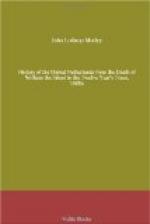Early in March a triple proposition was made by the States’ commissioners. Spain might take her choice to make peace on the basis of free trade; to make peace, leaving everything beyond the Tropic of Cancer to the chance of war; or to make peace in regard to all other than the tropical regions, concluding for those only a truce during a definite number of years.
The Spaniards rejected decidedly two of these suggestions. Of course they would not concede freedom of the sea. They considered the mixture of peace and war a monstrous conception. They were, however, willing to favour peace for Europe and truce in the tropics, provided the States bound themselves; on the expiration of the limited period, to abandon the Indian and American trade for ever. And to this proposition the States of course were deaf. And thus they went on spinning around, day after day, in the same vicious circle, without more hope of progress than squirrels in a cage.
Barneveld, always overbearing with friend or foe, and often violent, was not disposed to make preposterous concessions, notwithstanding his eager desire for peace. “The might of the States-General,” said he, “is so great, thank God, that they need not yield so much to the King of Spain as seems to be expected, nor cover themselves with dishonour.”
“And do you think yourselves more mighty than the Kings of England and France?” cried Richardot in a great rage, “for they never dared to make any attempt upon the Indies, East or West.”
“We are willing to leave the king in his own quarters,” was the reply, “and we expect him to leave us in ours.”
“You had better take a sheet of paper at once,” said Richardot, “write down exactly what you wish, and order us to agree to it all without discussion.”
“We demand nothing that is unreasonable in these negotiations,” was the firm rejoinder, “and expect that nothing unjust will be required of us.”
It was now suggested by the States’ commissioners that a peace; with free navigation, might be concluded for Europe, and a truce for other parts of the world, without any stipulations as to what should take place on its termination. This was hardly anything new, but it served as a theme for more intellectual buffeting. Hard words were freely exchanged during several hours; and all parties lost their temper. At last the Spaniards left the conference-chamber in a rage. Just as they were going, Barneveld asked them whether he should make a protocol of the session for the States-General, and whether it was desirable in future to resume the discussion.
“Let every one do exactly as he likes,” replied Spinola, wrathfully, as he moved to the door.
Friar John, always plausible, whispered a few soothing words in the ear of the marquis, adding aloud, so that the commissioners might hear, “Night brings counsel.” These words he spoke in Latin.
“He who wishes to get everything is apt to lose everything,” cried, out Maldere, the Zeeland deputy, in Spanish, to the departing commissioners.




